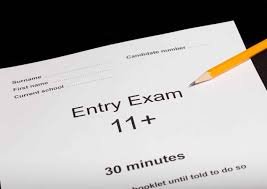The 11 plus is an entrance exam used by grammar schools and private schools all around the country. As a parent who can’t afford to pay for a private school we have to hope that our child can pass and get into one of the grammar schools. As a parent we want the best for our children and want them get a good start to life and not to be disadvantaged. We all know the school your child goes to will have a direct impact on their future.
Areas Tested in the 11 Plus
Not all tests are built equally and different counties will use different versions – there are two exam boards which design tests (CEM and GL) and its worth asking the school which one your child will be sitting. Generally the areas (or disciplines) being tested are Maths, English, Verbal Reasonining and Non-verbal Reasoning.

Maths and English in the 11+ test check a child’s understanding of these subjects up to the end of year 5 but its worth covering a lot of year 6 too. The questions stretch the material and assume your child has gone to the best school which has pushed up to the edge of the curriculum – its definitely worth covering this material and practicing at a year 6 level.
Non-verbal and verbal reasoning are a little different and don’t directly cover the material your child has covered at school. What they do test is your child’s vocabulary and ability to see patterns, sequences and connections in words and symbols. It’s unlikely your child will ever have done these types of questions at school so its definitely worth practicing 11+ questions in these areas.
English 11+ Practice Questions
The English skills being tested during the 11 plus test is essentially the same as the work done during KS1 and KS2. The problem is the type of questions being presented are different to what the student is accustomed to. Practice, practice, and more practice is key.
Some of the topics which will come up in he 11+ English section are shown below. A complete set of exercises area available on this site;
Adjectives, Adverbs, Alliteration, Ordering Alphabetically, Antonyms, Apostrophes, Questions, Capital Letters, Commas, Compound Words,Comprehension, Connectives / Conjunctions, Direct Speech, Fact and Opinion, Vocabulary, Indirect Speech, Metaphors, Negatives, Nouns, Onomatopoeia, Paragraphing, Prefixes, Prepositions, Pronouns, Punctuation, Rhyme, Sentence Openers, Similes, Spelling, Suffixes, Synonyms, Their, They’re and There, Verbs, Your and You’re
Maths 11+ Practice Questions
The Maths skills, just like English, tested during the 11 plus is essentially the same as the work done during KS1 and KS2. The problem is the type of questions being presented are different to what the student is accustomed to. Practice, practice, and more practice is key just like before !
Some of the topics which will come up in he 11+ Maths section are shown below. A complete set of exercises area available on this site;
Addition and Subtraction, Compare and Order Numbers, Decimal Numbers, Fractions, Handling Data, Measures, Multiples, Multiplication and Division, Negative Numbers, Number Sequences, Percentages, Perimeter and Area, Place Value, Position, Properties of Numbers, Ratio, Rounding Numbers, Shapes, Solving Problems, Time
Verbal Reasoning 11+ Practice Questions
This section of the 11 plus is something new to students. Its tests the students ability to see patterns between words and a wide vocabulary is essential. Synonyms, antonyms, and other such word matching skills are critical. Below are some of the areas which generally will appear in the 11 plus test;
Anagrams, Similes, Complete Sums and Words, Compound Words, Follow Logical Instructions, Find Hidden Words, Insert Letters, Connect Letters / Words / Numbers / Symbols, Make Words, Make Larger Words, Move Letters, Number Series, Grouping Words, Opposite Meetings, Words Questions, Related Numbers / Words, Same Meaning, Odd Words Out, Word Connections, Word-Number Codes, Words with Multiple Meanings
Non-Verbal 11+ Practice Questions
Non-verbal skills are the least familiar questions for students and parents. The questions are very similar to what you would see in a IQ test with lots of shapes and patterns which need to be completed or grouped. The test is designed to determine a child’s intelligence and aptitude. The ability to learn new subjects is incredibly important and goes hand in hand with subject specific knowledge. Although this area is difficult to revise for there are still strategies and exercises that can be used to develop certain skills ad abilities which will help.
Here are some areas which can be reviewed and practiced to help improve and develop the skills required to do better in this area;
Similar shapes and figures, Breaking Codes, Completing Series of Shapes, Matrices, Find the Odd One, Analysing Shapes and Letters,
Practice Questions
Watch this space for some practice exercises and quizzes which we’ll soon be adding to the site. If you think of anything that you need to be included please don’t hesitate to comment with details. I’ve put together a short online quiz which you can try now (click here).
